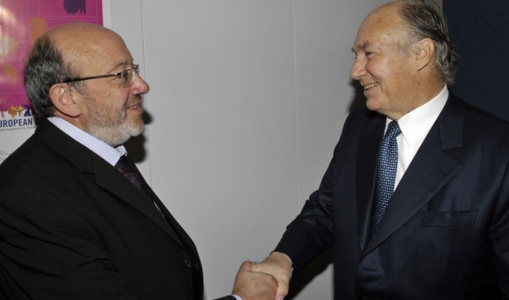Note: Audio is placed below the main text, when available.
EUROPEAN COMMISSION AND AKDN SIGN JOINT DECLARATION - 2007-01-23
President José Manuel Barroso of the European Commission and His Highness the Aga Khan, Founder and Chairman of the Aga Khan Development Network (AKDN), today signed a Joint Declaration. that aims to broaden the scope of their collaboration on development endeavours, strengthening civil society institutions, promoting governance and social inclusion, in countries of Central, South and West Asia, sub-Saharan Africa and the Middle East.
Distinctive in its recognition of the AKDN’s experience, the Joint Declaration seeks to extend the European Commission’s long-standing partnership with the AKDN into areas of common concern and in a number of new fields of activity.
Since 1986, the European Commission has made grants totalling €153 million to AKDN programmes in education, urban and rural development, food security, livelihoods, infrastructure, microfinance, water and sanitation, and disaster preparedness across Asia and Africa.
Acknowledging this engagement, on behalf of millions of beneficiaries, the Aga Khan said “our Joint Declaration represents a commitment to go beyond our common concerns about poverty and the need to improve living conditions in the developing world.” “We now look to enhancing our two-decade long partnership to contribute towards creating stability, mitigating conflict, fostering greater social inclusion and enabling equitable and sustainable human development.”
President Barroso noted that the European Commission and the Aga Khan Development Network had “worked together in some of the most difficult regions of the World.” Citing as examples of “real results” achieved, he mentioned “delivering primary education in Northern Pakistan; improving livelihoods in Central Asia and guaranteeing food security in Afghanistan.” Referring to the need to create “a climate of mutual respect so we can identify common interests”, President Barroso also said, “the European Union in particular must understand and learn more about Islam.”
The Joint Declaration looks to the following areas of collaboration:
Supporting regional or sub-regional cooperation and area-based approaches;
a) Creating and promoting an enabling environment through the promotion of health, education and rural development and institutional building initiatives;
b) Utilising culture as a means for rehabilitation and development;
c) Economic development and the strengthening of local and regional markets through investments in infrastructure, private sector development and microfinance;
d) Strengthening civil society and civil society institutions, and related participatory processes and partnerships with government and the private sector, as enablers of good governance; and
e) Collaborating on conceptual approaches towards urban regeneration and social inclusion.
The AKDN has signed agreements of cooperation and protocols with 15 countries in Africa, Central and South Asia, Europe and the Middle East as well as with international organisations and multilateral and bilateral agencies such as the United Nations Development Programme (UNDP), the World Health Organisation (WHO), Germany’s Ministry of Economic Cooperation and Development (BMZ), Norway’s Ministry of Foreign Affairs, the United Kingdom’s Department for International Development (DfID) and the Canadian International Development Agency (CIDA). Under an international treaty signed by the Aga Khan and the Presidents of Tajikistan, Kazakhstan and the Kyrgyz Republic, the AKDN is establishing the University of Central Asia, to serve a region of some 25 million people.
During his visit to Brussels, the Aga Khan held discussions with the European Commissioner for Development Louis Michel, the European Commissioner for External Relations Benita Ferrero-Waldner, as well as the EU High Representative for the Common Foreign and Security Policy and Secretary-General of the European Council, Mr Javier Solana and Mr Pierre Morel, EC Special Representative for Central Asia. He also met with NATO Secretary-General Jaap de Hoop Scheffer.
The Aga Khan called on the President of the European Parliament, Dr Hans-Gert Poettering and had meetings
with Belgian Foreign Minister Karel De Gucht and Belgian Development Minister Armand De Decker. Dr. Frank-Walter Steinmeier, the German Foreign Minister, in Brussels for meetings under Germany’s Presidency of the European Union, also held talks with the Aga Khan.
For further information, please contact:
Nadia Verjee
External Relations and Policy
Aga Khan Development Network
- 8488 reads
 Ismaili.NET - Heritage F.I.E.L.D.
Ismaili.NET - Heritage F.I.E.L.D.